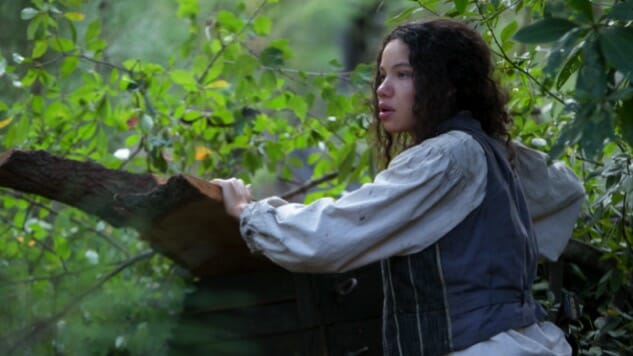Black Rose: Motherhood, Defiance and Other Dark Matter in Underground, “Things Unsaid”
(Episode 2.02)
WGN America
“I keep thinking about children.” —Elizabeth
Somewhere between my first and second child, I realized that motherhood was probably the creepiest, darkest and most fascinating experience one might ever find oneself in. It’s no wonder men have, since practically the beginning of time, sought to control the circumstances under which women create life. It’s a power and privilege unlike anything else, and I’ve always felt that, while motherhood may be perfectly natural, it’s not for the faint of heart.
I think the creators and writers of Underground have always understood the advantages of storylines centered on mothers and mothering. In the pilot episode, “The Macon 7,” we first met Rosalee and Ernestine as they were helping Seraphina give birth—a birth that resulted in an “ugly death.” Seraphina’s decision to kill her own newborn child felt drastic at the time, but we would go on to hear echoes of such a sacrifice throughout the season. In many ways, Underground keeps posing the question Toni Morrison posed when she wrote Beloved years ago: How far should a mother living under slavery go to ensure her child’s freedom? Do you run away, as Beloved’s Sethe tried? Do you stay behind, like Pearly Mae? Do you try to give them the best “life” you can, from the Big House, like Ernestine? When things get complicated, do you kill for them—even when it’s someone close to you—à la Ernestine and Pearly Mae? Or do you rebel against the entire system and refuse to allow them to experience slavery at all, like Seraphina?
These are some of the questions I imagine might have crossed Clara’s (DeWanda Wise) mind when she considered keeping, or not keeping, her baby. The scene where she goes to Ernestine for the medicine that will induce a miscarriage is awkward, and telling. On the one hand, we’re witnessing an interaction between—I’m sorry, I gotta say it—the side chick and the main chick. If you’ve never been in a situation where you’ve had to enlist abortion services from the girlfriend of the guy you’re sleeping with, then your life probably doesn’t have as much drama as you think it does. But, all Love & Hip Hop vibes aside, this scene also presented what may arguably be one of the most common, private conversations among women—the “should I keep this baby” conversation. And because of the setting, that dialogue is all the more difficult. Clara is clearly inclined to keep her baby, but Ernestine’s lover/her babydaddy is not interested. She wants someone, perhaps, to give her a different perspective.
“You got chillun?”
“Yes.”
“And?”
“And they were the best thing in my life.”
(To borrow from Toni Morrison, no—you your best thing, Ernestine.)
Listening to Clara and Stine, one can’t help but wonder: Is there any benefit to having children under slavery? You’ve no control over their lives, their upbringing and their happiness. When the ghost of Sam’s father (French) contradicts Ernestine later and says, “your children were the worst thing that ever happened to you,” (adding that Stine had herself fixed so as not to bear children again, after little James) I believe he’s pointing to Ernestine’s current state of heartbreak and despair. One child hanged, two others in unknown locations. She may never see them again. Was it worth it?
And that’s what Clara wants to know. Will it be worth it in the end? And, of course, in the end it doesn’t matter anyway, because a man chooses for her.
-

-

-

-

-

-

-

-

-

-

-

-

-

-

-

-

-

-

-

-

-

-

-

-

-

-

-

-

-

-

-

-

-

-

-

-

-

-

-

-








































